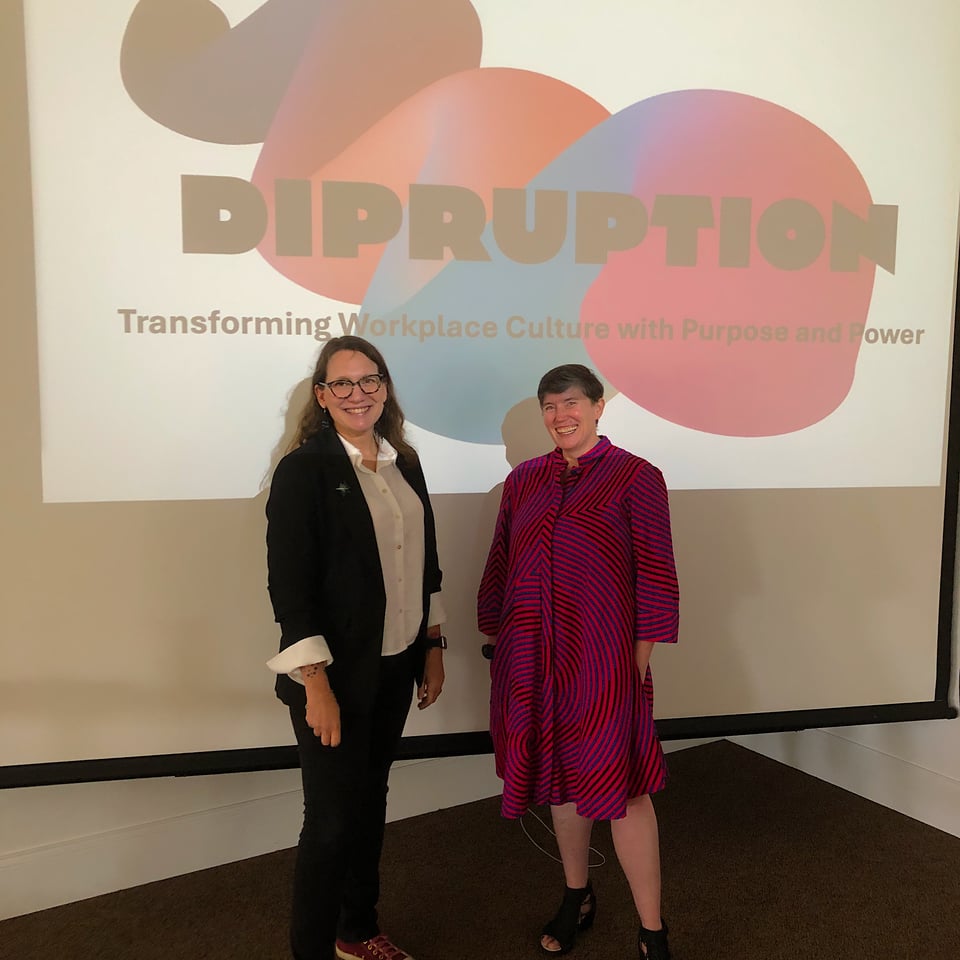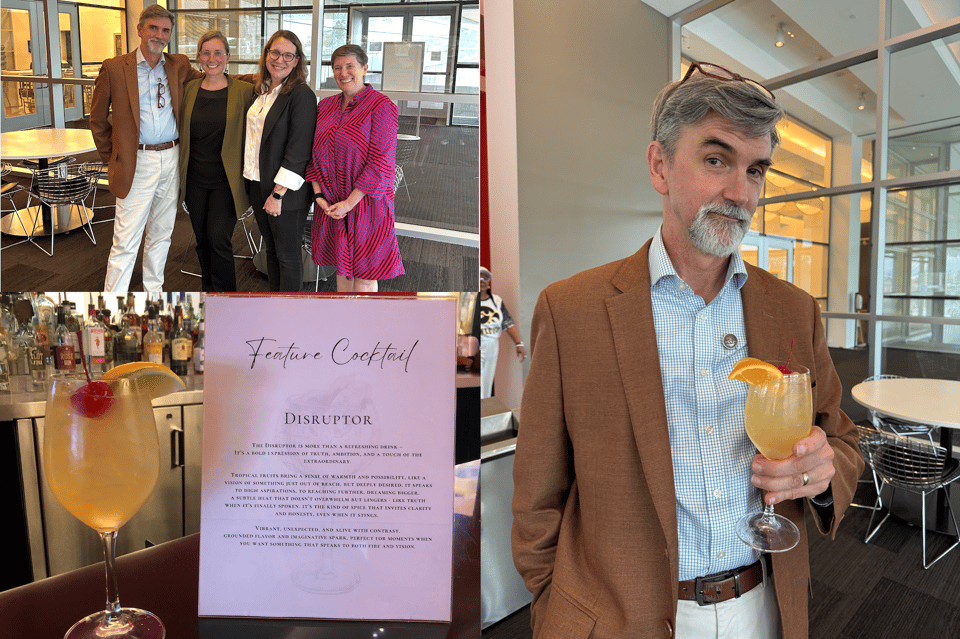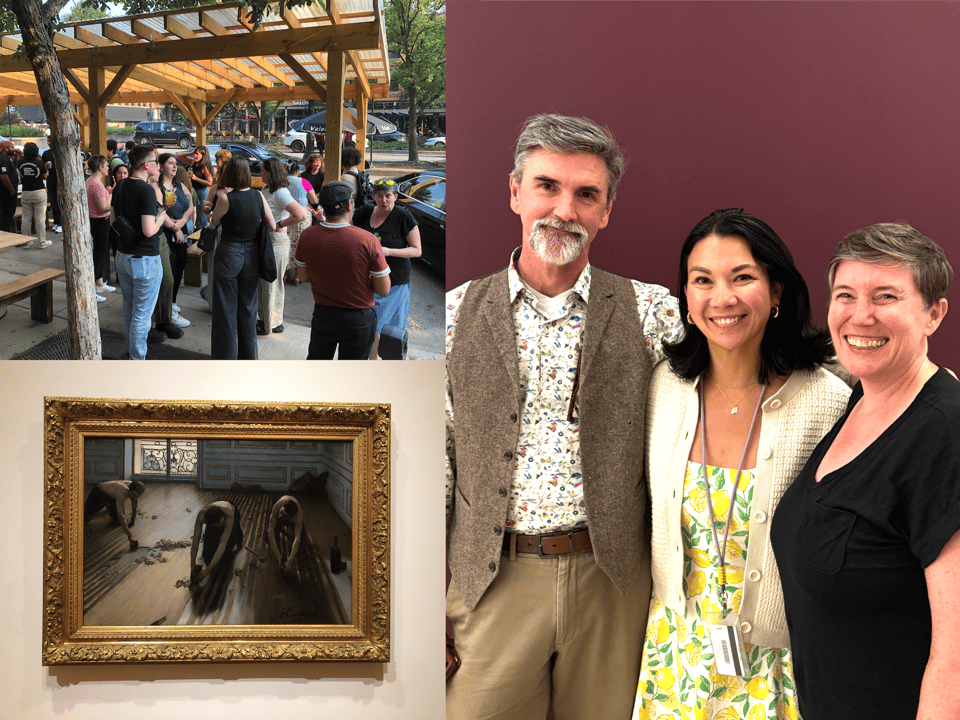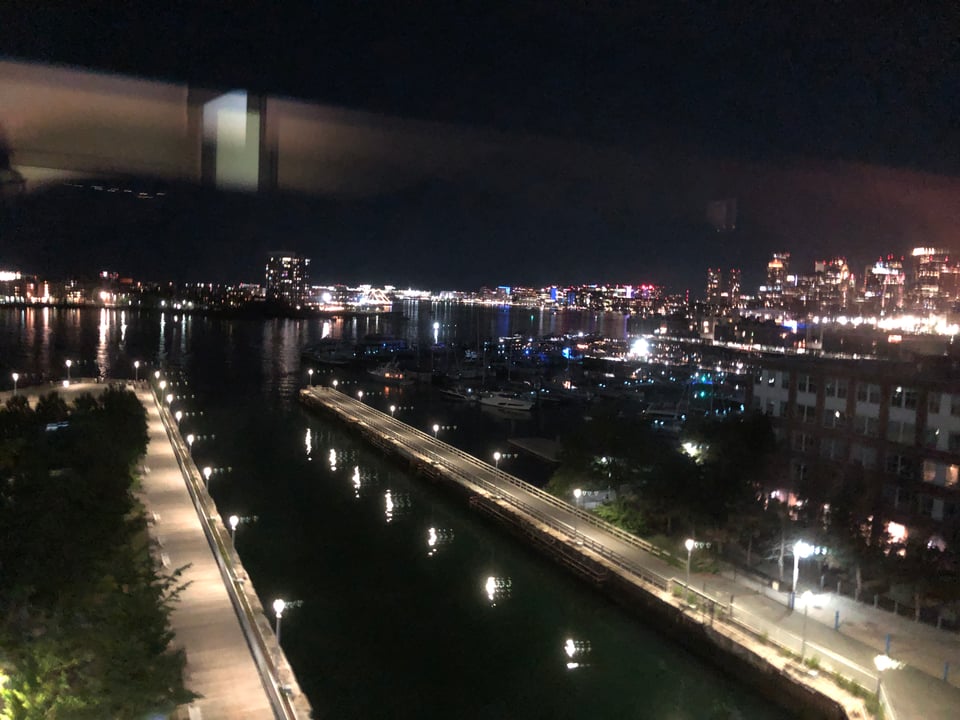Episode #5 - On Resilience
Exploring disruption in museums, networking in Chicago, running a workshop at SITES and an accident!
The end of the school vacation period has been a busy one and I have been doing some experimenting. Along with fellow Getty alums Hilary Spencer and Jennifer Foley, we presented a workshop at the Association of Midwest Museums Conference on workplace disruption. Disruption in the sense of ending practices that no longer serve in order to make space for new ones, not just making a mess (although that would be an interesting session!). Hillary who has long been ringing the bell for change in museums invited Jennifer and me to come bring our perspectives to the workshop, so of course I brought along my favorite new sense making tools because that's where my brain is right now.

I won't go too much into the workshop, that's Hillary’s story to tell, but what I will say for my part is that once people got over the consultant-speak feeling when I first rolled out the concept of BANI, which I talked about in Episode 3, we had a good conversation about how understanding where one was both as an institution and as individuals in an institution seemed like a useful starting place for grounding responses to a highly volatile world. Indeed, as Jamias Cascio who invented the BANI framework said, “Rather than saying something about the world, it [BANI] first and foremost says something about how we perceive it.”
And that distinction I think is an important one, because in order to change the way we structure our work, we need to understand the way we perceive our work. So, knowing that we perceive an anxious world, how do we respond to that anxiety? Knowing that things defy straight logic, how do we plan a way forward into the future? Cascio offers some ideas, “brittleness could be met by resilience and slack; anxiety can be eased by empathy and mindfulness; nonlinearity would need context and flexibility; incomprehensibility asks for transparency and intuition.” If you close your eyes and imagine an institution that is led by these principles, what kind of workplace do you see? Pretty interesting, isn't it?
After the event, we got to spend some time with another Getty alum, Melissa Mohr director of the Figge Art Museum. She hosted a small CEO event for local leaders to hang out and talk about what productive disruption might look like in their institutions. And there was even a signature cocktail, which is the first for me! “The Disruptor!” Change never tasted so good!

I got to see an example of a good response to a BANI world while we were in Chicago. Old friend Nikhil Trivedi hosted a Drinking About Museums for us while we were there and it was so invigorating to see both the turnout and the relative youthfulness of the attendees. Building personal professional networks has been so essential to my career, and I benefited from coming up in the field in an era when conference travel was much more widespread than it is today. So many of the people I consider my peers and colleagues are ones I first met at awkward socials or bus tours or just standing in line at various conferences. Knowing that the opportunity space today is much more constrained, self organized, scrappy, grassroots efforts like DAM I think fill an important void. I'm at new folks caught up with old folks, and even read a book from the book for the crowd which was definitely not something I had in my in my bingo card.

The other big experiment was testing out a day-long workshop based on the ideas in the book that I ran at the Smithsonian Institution's Traveling Exhibition Service (SITES) the next week. Given the current political moment, doing anything with the Smithsonian is freighted with all kinds of thoughts and feelings. Carol Bossert, who brought me down, wanted to help her staff build a shared vocabulary of ideas and concepts to help them in their work, and I was very happy to be allowed to work with them. The whole vibe in DC is weird right now, and I am glad I don't have to work there, but at the same time, it felt good to be doing something to help an institution under attack try to carry on doing the vital work that they do. More power to them.
I think the workshop went really well! People were engaged, there were good questions, and we spent part of the day out on the mall actually looking at a Smithsonian exhibition through the lens of playful engagement to try to see things we might do differently based on what's in the book. This is something that sounds interesting to you, don't hesitate to hit me up and I'll send you a description!
John Gordy also arranged another Drinking About Museums while I was there, so I got to be reminded again of how important it is to be able to get together outside of working hours and share all the things that need to be shared and to reinforce the notion that we're not in it alone.
The highlight of that trip though, was thinking about reviving an old experiment with a couple of old friends. Back in the mid 2010s, Suse Anderson, Rob Stein, and I cooked up an experiment: an online publication called CODE|WORDS:Technology and Theory in the Museum, which tried to play with the affordances of digital publishing to see if we could do something new and interesting with museum discourse other than the usual “Let's go to a conference and write a paper and make a PowerPoint deck!” model that we were all familiar with. The first experiment wound up being a Medium publication, and eventually a book.
CODE|WORDS:v2, A Series of Epistolary Romances remained a purely digital being that tried to connect pairs of thinkers and bring readers along on their evolving correspondence. When I told them I was coming down to DC and had been thinking about CODE|WORDS, they both said, “I'd also been wondering if things had changed so much that it might be time to try another…” As we sat at dinner, we talked about how much the digital realm has morphed since 2014 and how much the opportunity space–particularly for emerging professionals–has shrunk. We left the conversation with nothing more than the sense that there was a there there, so expect to hear more about left in CODE|WORDS v3 in the coming months
Then came the accident.
Last Tuesday morning, I was bicycling along the Charles River on my way to a meeting and ducked under a low hanging tree branch. At least I thought I had ducked under it. In reality, the top of my helmet hit the tree branch and jammed my head down onto my spine and paralyzed me from the neck down. My bike and I went sailing off the side of the path, and I flew like a limp Superman over the handlebars of the bike and into the bushes by the river’s edge. I never lost consciousness during the event. And it was over so quickly it took me a little while to recognize what had happened. I had a mouthful of dirt and leaves. I couldn't see anything because I was mostly faced down. And strangest of all? I couldn't move any of my body from the neck down. I've never felt so heavy in my entire life. It wasn't that I couldn't feel my body, I knew it was there. I could feel every inch of it being pushed against the ground by gravity. I just couldn't move any of it.
Luckily, it was a sunny weekday morning, and the pathway was full of people who had seen and heard the accident. And before long I was surrounded by a swarm of first responders who got me out of the bushes, cut off my clothes (nice ones ☹), strapped me to a backboard and took me off to the hospital. In the few minutes that was happening, I thought a lot about brittleness. I thought about how the week ahead that I had planned out was now going to go completely out the window. I thought about my plans for the future and how they might go completely out the window. And strangely enough, I worried a lot about my bike “Where's my bike?,” “How's my bike?”.
Jennifer and I spent a very long day in the emergency room while the diagnoses came in. Some cuts, some bruises, A chipped tooth. No obvious broken bones. Then a spinal fracture on T8. And the “good” news that spine surgery did not seem to be worth it and that time would tell how much function would come back. Over the next few days. I learned all kinds of things about myself. I learned a tremendous amount about disambiguating my sense of personal dignity from my physical body, having had to rely on others to feed me, bathe me, scratch my nose, etc. And all sorts of other things. I learned how much I take this body for granted and how my ability to move it through the world is just a baseline expectation. And have not having that baseline changes every other thing. I had already had a deep respect for nurses and the work they do, but that has now grown into full blown love and fanboying. I have been so well taken care of by a seemingly never-ending series of strangers who just want me to get better.
And because I'm that particular kind of idiot and I've had a lot of time on my hands over the past few days, I've been thinking about. How does this help me in my work? Well, for starters, when you're lying mostly motionless for hours on end in a hospital, you spend a lot of time listening to conversations and consultant Ed couldn't help but start diagnosing organizational structures and culture of the hospital. The disconnect between the nurses and techs who spent most of their time facing patients (front of house staff) and the doctors who spend most of their time facing each other (back of house staff). It reaffirmed my conviction that a great deal of what we in museums think of as being precious and unique about our sector is really shared with most of the rest of the world. The BANI framework really hits differently now. I have a very clear and visceral sense of what brittleness means that I didn't have last week, and I have a much clearer idea of how absolutely essential building resilience is in the face of innate brittleness. And in the face of current events, TEA’s emphasis on helping clients build strategies that are like boats rather than bridges makes a lot more sense to me in an intuitive level, given how unknowable the future is.
It feels a little strange to be including so much personal information in this episode, but at the same time, it's impossible to disambiguate it from my professional work, nor do I think that separation of work self and personal self is particularly helpful anymore in the current world, so there we are.
I am writing this from the bedside of my room in the rehab hospital which overlooks Boston Harbor and is absolutely glorious with the boats going hither and thither and the airplanes coming and going from Logan. I am deep in rehab for the next couple of weeks and all the therapists tell me My prognosis looks good, “You’re doing great, Ed!” We will see what the final result will be, but I will be hopeful. And if you've got any good thoughts or prayers to send my way, I will welcome them.

If you're in Minneapolis and late October, I will hope to see you at the MCN conference, and if you're at NEMA, I am planning to be there for at least one day for a book signing so do come by and say hello!
All best wishes,
Ed
P.S. My family recovered my bicycle from the State Police, and it's just fine,so don’t worry!